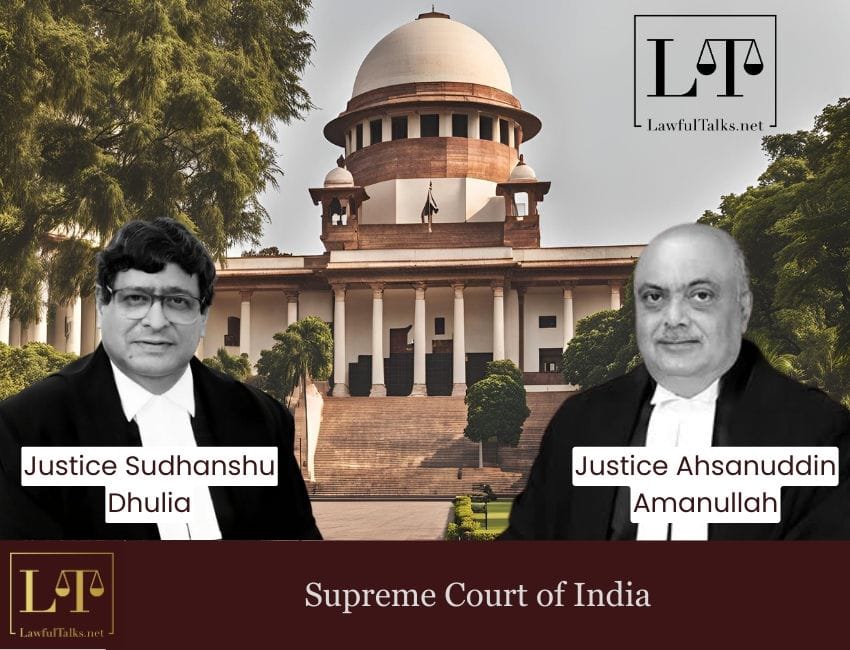Allahabad HC Sets Aside Afzal Ansari's Conviction, Allows Him to Continue as MP

The Supreme Court in a recent ruling underscored that to qualify as a "consumer" under the Consumer Protection Act, 1986, there must be a direct contractual relationship between the parties. The bench, comprising Justice Sudhanshu Dhulia and Justice Ahsanuddin Amanullah, emphasized that a party lacking privity of contract with the service provider cannot be considered a consumer under the Act.

The judgment, authored by Justice Amanullah, overturned a decision by the National Consumer Disputes Redressal Commission (NCDRC) and delved into the intricacies of contractual obligations and consumer rights.
The case arose from a dispute involving the respondent, Snehasis Nanda, who had purchased a flat in Navi Mumbai with a housing loan of Rs. 17,64,644 from ICICI Bank. In 2008, Mubarak Vahid Patel, the borrower, expressed interest in buying the flat for Rs. 32,00,000. Patel approached Citicorp Finance (India) Limited, the appellant, for a housing loan of Rs. 23,40,000.
Since the flat was already mortgaged with ICICI Bank, Patel requested Citicorp to disburse Rs. 17,80,000 directly to Nanda’s ICICI Bank account to facilitate the release of the flat. Citicorp complied, but the remaining amount of Rs. 13,20,000 was never paid to Nanda, prompting him to file a consumer complaint before the NCDRC.
Nanda claimed that a tripartite agreement existed between him, Patel, and Citicorp, which obligated Citicorp to pay the entire sale consideration of Rs. 32,00,000. The NCDRC ruled in Nanda’s favor, directing Citicorp to refund Rs. 13,20,000 with interest and pay Rs. 1,00,000 as litigation costs. Citicorp appealed this decision to the Supreme Court, arguing that Nanda was not a ‘consumer’ under the Act and that no tripartite agreement existed.
The Supreme Court, after examining the facts, held that the essential transaction was between Nanda and Patel, the buyer of the flat. The Court noted, "In the specific factual setting, the respondent, having no privity of contract with the appellant, cannot be termed a 'consumer' under the Act. This alone was sufficient to dismiss the complaint." The Court further observed that the loan sanctioned by Citicorp to Patel was only for Rs. 23,40,000, and thus, the NCDRC erred in directing Citicorp to pay the entire Rs. 31,00,000.
The Court also highlighted that the purported tripartite agreement, even if it existed, only required Citicorp to pay the foreclosure amount to ICICI Bank on behalf of Patel. The Court stated, "No further liability to pay any amount directly to the complainant-respondent was even envisaged in the Tripartite Agreement." It concluded that Citicorp’s liability was limited to satisfying the dues of Nanda with ICICI Bank, which amounted to Rs. 17,87,763, and could not exceed Rs. 23,40,000.
In its final analysis, the Court held that Nanda did not qualify as a ‘consumer’ under the Act due to the absence of a direct contractual relationship with Citicorp. The Court reiterated, "It is clear that the complainant-respondent cannot be said to be a 'consumer' under the Act as it had no privity of contract with the appellant." Consequently, the Supreme Court allowed Citicorp’s appeal and set aside the NCDRC’s order, marking a pivotal clarification on the interpretation of consumer rights under the Consumer Protection Act.
The Court also addressed the issue of limitation, noting that the respondent had filed the complaint in 2018, ten years after the cause of action arose. The Court observed, "While the NCDRC is competent to condone any period of delay in filing a complaint beyond two years from the date when the cause of action arises, the discretion is circumscribed by twin conditions: (i) that the complainant satisfy the NCDRC that he had sufficient cause for not filing his complaint within such period, and; (ii) that the NCDRC record the reasons for condoning such delay." The Court found that the NCDRC had failed to record any reasons for condoning the delay, further undermining its decision.
In conclusion, the Supreme Court’s ruling reaffirmed the necessity of a direct contractual relationship for a party to be considered a consumer under the Consumer Protection Act. The judgment not only set aside the NCDRC’s order but also provided clarity on the limitations of consumer claims in the absence of privity of contract. The Court’s decision serves as a significant precedent in consumer law, emphasizing the importance of contractual relationships in determining consumer rights and liabilities.
Case Title: M/S CITICORP FINANCE (INDIA) LIMITED VERSUS SNEHASIS NANDA
Advocates For Petitioners: Mr. Ritin Rai, Mr. Sanjay Kumar, Mr. Chanchal Kumar Ganguli.
Advocates For Respondents: Respondent-in-person




















































































































































































































































































































































































































































































































































































































































































































































































































